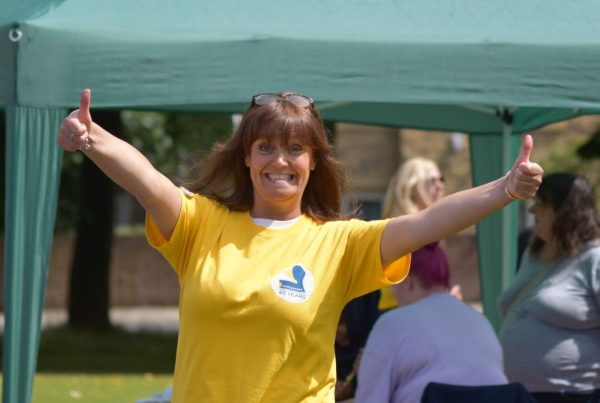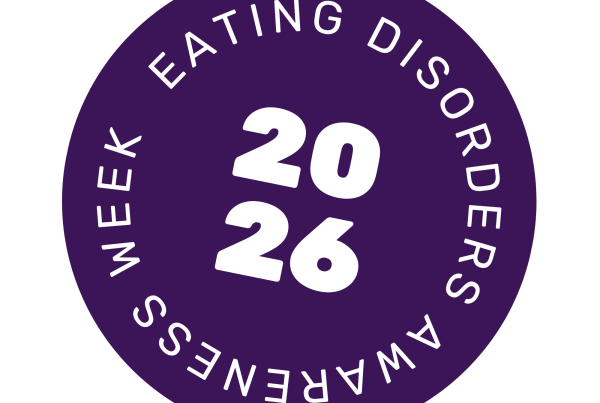Luminate Education Group is an active member of our Leeds Mindful Employer Network and has been a Mindful Employer Charter Signatory since 2016. Leeds Mindful Employer Network Project Lead, Leigh Staunton, caught up with Luminate’s Workforce Wellbeing Coordinator to discuss how they support their workforce of 2,500 staff working across around 16 sites.
Hi Bethan! Please tell us a bit about yourself and your role at Luminate Education Group

Bethan Powell, Workforce Wellbeing Coordinator, Luminate Education Group
My name is Bethan Powell, I am the Workforce Wellbeing Coordinator for Luminate Education Group. Luminate Education Group contains three educational institutions in Leeds: Leeds City College, University Centre Leeds and Leeds Conservatoire, as well as two colleges in the wider Yorkshire region; Harrogate College and Keighley College. My role sits within our Student Life directorate in our safeguarding and wellbeing team, but I have strong links and working partnerships with our People, Development and Culture directorate.
My role is really varied, which is why I enjoy it so much! From welcoming new starters, to writing the Workforce Wellbeing Strategy, to designing new wellbeing initiatives and campaigns, there’s never a dull moment! I also manage the Wellbeing Champion Network, our Menopause Advocates, and I am the co-chair of the LGBTQ+ Forum.
Why is mental health important to you, both as an individual and as an organisation?
My background is in medicine and public health, so prior to working at Luminate Education Group, I worked in community mental health, as well as emergency medicine, where we often treated patients who were in crisis. For me, being able to work in an organisation where a proactive approach to mental health is taken seriously and prioritised – not just for students, but staff as well – fits with my core values. Mental health isn’t an island, it’s connected to all of the other aspects of our lives: physical health, social wellbeing, financial wellbeing, and spirituality. So by looking after our mental health, we can give ourselves the best opportunity to look after the other aspects of our wellbeing as well. When one area of our wellbeing is disrupted, they can all become disrupted.
As an organisation, our mission is to transform lives through the power of education, in an inclusive environment where we work together in a way that values relationship building. Being able to look after the mental health of our students is paramount, but to be able to do that, we must help create and sustain environments that support the mental health of our staff. Educators today are asked to be more than teachers – they are life coaches, signposting to welfare services, liaising with social care and CAMHS, and providing in-the-moment emotional support daily. It’s time that schools and colleges focus on their staff’s mental and emotional wellbeing too, which is where my role comes in.
You recently spoke at the Association of Colleges (AoC) Mental Health and Wellbeing Conference in May alongside your colleagues from Luminate. How was that experience?
We were honoured to be asked by the AoC to talk at their annual health and wellbeing conference, and to be able to share our journey and inspire others to take their first steps towards prioritising staff wellbeing. It was definitely a showcase of resilience and adaptability – the fire alarms went off in the first 10 minutes of our presentation! But after a quick dash to University Centre Leeds, the show went on, and we really enjoyed being able to share our journey.
One of the items you spoke about at the conference was the importance of getting the fundamentals right. Can you tell us a bit more about what you mean by that?
As an educational group, working as a public sector organisation, we recognise that we don’t have the same spending and budget power as some of the other organisations who have shared their journeys. Over the last two years, I’ve heard a lot of approaches to improving wellbeing that we simply can’t do; I’d love to take all of our staff to a weekend wellbeing retreat but sadly, with 2,500 staff, it’s never going to be in our powers! For us, the conference was a great opportunity to share some relatable ways in which other educational establishments, and other people who are working on a low/no-cost budget, can improve the wellbeing of their staff. Within the education sector we all face similar challenges with budgets, underfunding, numbers of staff, and even the spread of staff across geographically separate campuses, so the feedback we received from sharing some of our initiatives and the steps we’ve taken, was really positive.
One of the things we recognise is that when people feel safe, when they feel listened to, and when they feel that there is support available, they are more likely to open up about struggles they may be having. For us, our core values are using relational practice, being trauma-informed, and being open-minded and ready to learn from each other. For the conference, the three main areas that we focused on to demonstrate how we work within those values to improve wellbeing, were confidence-building, empowerment, and psychological safety. When you get those things right as the foundation, you can start building up a bigger programme to improve wellbeing.
Tell us about your approach to fostering psychological safety and confidence at Luminate. What practical steps have you taken in this area and what has the impact been?
Our journey to fostering psychological safety has been a long one! We recently looked back at our journey, and it’s been 10 years in the making! It started with a focus on students, with the creation of the Student Life directorate, which also houses departments such as EDI, safeguarding, and student engagement, and the provision of counselling for students.
A year later, we started our journey of relational practice, and this is one of the biggest ways in which we drive psychological safety for staff and students through focusing on building relationships, creating fair processes, and making sure that the voice of our staff and students is central to our decision-making.
In the last 5 years, triggered by the effects of Covid on staff and students’ health and wellbeing, our Student Life team expanded, with the creation of roles such as Head of Wellbeing and Relational Practice, the core relational practice team, and Workforce Wellbeing Coordinator.
Covid really was a trigger for us to increase the wellbeing support that we had in place for staff. With this focus, we’ve brought in new structures and processes, such as our Keeping in Touch meetings for line managers and their teams, our Staff Forums, and our two staff networks: The Wellbeing Champions and the Menopause Advocates. Where we focus our efforts for both confidence-building and psychological safety is on training and upskilling staff, particularly line managers. One of the big turning points was a full-day training on trauma-informed practice. It was a mammoth undertaking getting all 2,500 of our staff trained on the same day, but very much worth it.
In the past year, we have had a strong focus on training our line managers as we recognise that they are often the first people that staff members will talk to about their mental health, and we know that when managers feel more confident talking about mental health and wellbeing it leads to better outcomes for everyone involved. Within that training suite, we also included sessions on psychological safety for leaders, with options that suited different levels of experience.
For individual staff members, we try to include aspects of working on wellbeing at all of our staff development and our all-staff conference day. ‘I am Remarkable’ is one of our most popular sessions, but we also have sessions on resilience, recognising and avoiding burnout, and have even had Leeds Mind in with its ‘Food for Mood’ training session. We recently trialled a new workshop with self-led activities for wellbeing, giving people the time to try a little bit of everything from bird watching to sound therapy, which had great feedback and will be one that we run again. This is coupled with regular signposting to external support services and specialist training.
What are you most proud of in terms of Luminate Education’s approach to mental health at work?
What I am proud of in our approach is how we view mental health and wellbeing as being everyone’s responsibility. Whilst my role is Workforce Wellbeing Coordinator, there are so many people working towards the same goal of supporting and improving mental health and wellbeing, right from the top with our Executive Leadership Team, to the staff who volunteer to be Wellbeing Champions, and everyone in between.
What I really love is that we approach that goal in so many ways. Beyond training, workshops and upskilling staff to support each other, we know that looking after our mental health is also about being part of our community, being inclusive, taking part in social and community activities, and looking after our physical health too, and at Luminate we try to provide opportunities to do that, from being involved with Staff Forums, to taking part in the fun, but competitive, annual Luminate League Cup and community driven projects.
You’ve mentioned Relational Practice above, can you tell Leeds Mindful Employer Network members a bit about what relational practice is?
 Relational Practice recognises that relationships have a direct impact on people’s capacity to feel safe and succeed in education and work. This is particularly important for the wellbeing of people who have experienced trauma, and forms part of our trauma-informed practice. Having positive and encouraging relationships in the workplace allows us to have open and honest conversations, so we can get to the heart of the matter.
Relational Practice recognises that relationships have a direct impact on people’s capacity to feel safe and succeed in education and work. This is particularly important for the wellbeing of people who have experienced trauma, and forms part of our trauma-informed practice. Having positive and encouraging relationships in the workplace allows us to have open and honest conversations, so we can get to the heart of the matter.
Relational practices very much focus on working with people; we aim to be collaborative and include our staff and student voice within decision making and processes, rather than doing something to or for someone. For us, relational practice also means making sure we follow fair processes, making sure that people feel valued, listened to, and included. Because we have relationships that have been built on trust, honesty and respect, we are able to challenge each other constructively; we can’t all get it right all of the time! We do this by being mindful of the language we use and the way we structure our communication; by being aware that we all have our own stories which can affect our behaviours and reactions; and by using our process of engage, explain, expect.
Read more about relational practice, particularly for schools.
Relational Practice in more general environments is explained well in this video too.
What’s the biggest challenge you’ve overcome in terms of employee wellbeing since being in the role?
For me, it’s the sheer size of the organisation. We have around 2,500 staff across around 16 sites, all working in different ways. Working in education comes with its own challenges; with half of our staff curriculum-based, creating opportunities that everyone would be able to attend is impossible!
What are your priorities for the next 6 months?
I have some really interesting priorities over the next six months focused on different aspects of wellbeing. One of the biggest projects is to help reduce the prevalence of smoking and vaping in our staff and student body, which will include the creation of smoke-free and vape-free campuses. This project is still in its early stages but watch this space!
We are also continuing work on support around mental health; it’s never going to be a project that is “finished” in the traditional sense. We’ll be working with our line managers to find out what additional support and training they need to feel confident supporting their teams, using departmental data to drive initiatives and find our best practices, and making sure that we are advertising and promoting the initiatives that we have in place, so that everyone feels empowered to take action on their mental health.
In the next 6 months, we will also be submitting our application to Henpicked to become a certified Menopause Friendly employer. This process not only shows our commitment to supporting people experiencing menopause, but also measures the processes and structures we have in place to make sure they are effective.
And as always, I’ll be looking at what wellbeing workshops I can create, in line with the responses to our regular pulse surveys.
What would you say to someone considering becoming a Leeds Mindful Employer Network member? And why is Luminate an official Mindful Employer?
For us, being part of the Leeds Mindful Employer Network has been incredibly beneficial. Attending the Network meetings is an opportunity to hear what other organisations are doing, and sometimes it’s just good to hear that other people are working on the same challenges, or are focused on the same initiatives. It makes us feel that, firstly, we’re not alone with our challenges, but also confirms that we’re working on the right things.
Being able to say we are a Leeds Mindful Employer Member and a Mindful Employer Charter Signatory is a way of publicly demonstrating that we are taking mental health seriously, and it’s a way for us to show accountability. Mental health is everyone’s responsibility, and we want to make sure our employees know that’s how we feel.
A big thank you to Bethan for contributing to this blog.
Join the Leeds Mindful Employer Network.
Find out about becoming a Mindful Employer Charter Signatory.



